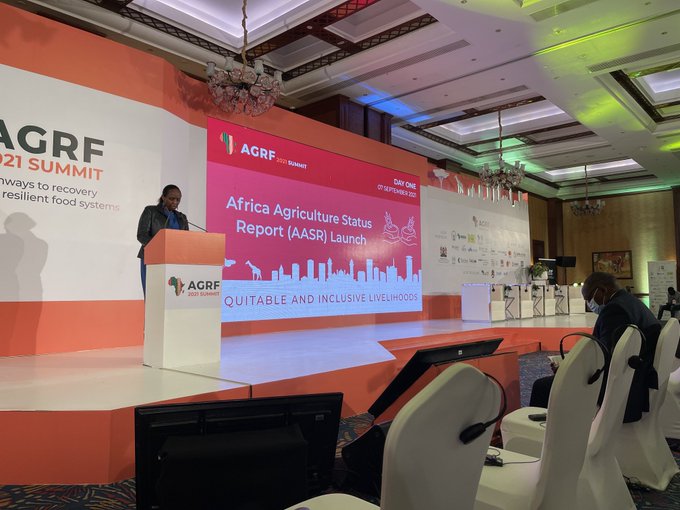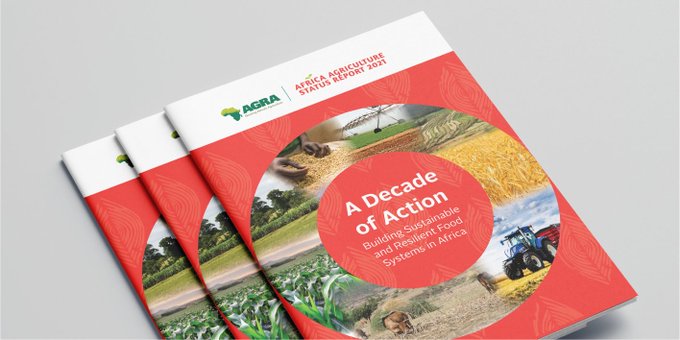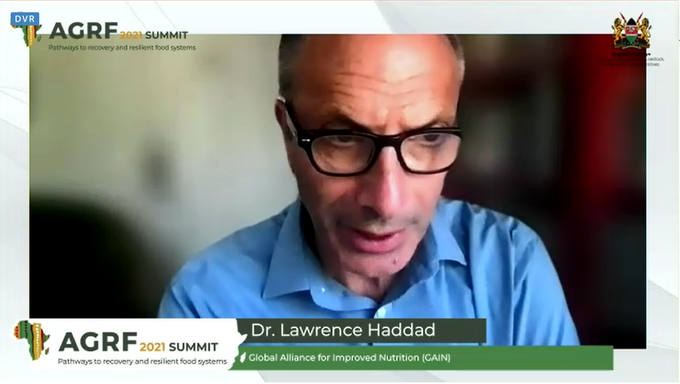This year's Africa Agriculture Status Report (AASR) focuses on unpacking the concept of sustainable and resilient agri-food systems.
AGRA. (2021). Africa Agriculture Status Report. A Decade of Action: Building Sustainable and Resilient FoodSystems in Africa (Issue 9). Nairobi, Kenya: Alliance for a Green Revolution in Africa (AGRA). 256 p.
This year’s Africa Agriculture Status Report (AASR)
focuses on sustainable and resilient agri-food
systems. This theme requires a whole systems
approach to agricultural production and food systems
management throughout the value chain. As a
result, the AASR21 has involved an unusually broad
range of disciplinary specialties and institutional
contributors.
This AASR21
has argued that lasting change is possible if African
governments play the role of leading domestic actors
effectively with the support of external stakeholders.
Africa can learn from the experiences of more
developed countries and avoid their mistakes. However,
Africa needs to step up and take the reins from others,
however well intentioned, who have been directing
the flows of international development assistance
for decades. There is no substitute for African-led
processes in local research and development, policy
formulation and implementation, and institutional
development. While international partners cannot
develop Africa by themselves, they can substantially
contribute if Africans and African organizations truly
take ownership and lead the process.
The most pressing challenges to sustainability and resilience of
African food systems are:
- Increasing prevalence of shocks from diseases, climate change, extreme weather events, conflict, policy instability, and domestic and international economic instability affecting trade and financial flows and the living standards affected by these.
- Low crop yield per hectare and per person, and slow improvements over the past decade. The pace of technological innovations that drive factor productivity growth and value addition along agricultural value chains remains slow in Africa compared to other regions of the world.
- Agricultural output growth through land use extensification leading to a degraded natural environment in rural areas and making the agriculture, forestry, and land use sector the largest contributor to green-house gas emissions in Africa (IPCC-Ar5).
- Food processing, packaging, distribution/ logistics, and agricultural market and regional market integration in Africa leaves significant opportunities for improvement. Despite possessing over 60 percent of the earth’s remaining potentially available cropland, African countries rely heavily on food imports to feed their citizens.
- Employment in food systems that features jobs that are mostly below or not far above the poverty line leaving millions of African hungry and highly vulnerable to shocks and stressors
A call to action is encapsulated in the actionable
policy recommendations:
- Priorities for African government action plans
- Priorities for Pan-African organizations
- Priorities for international organizations, bilateral and multilateral development partners
- Priorities for the private sector
 7 September 2021. The AASR launch dived deeper into the key topics covered in the report, including digital transformation, job creation, market opportunities, global sustainability, enhancing nutritional quality of food products and regreening Africa through ecosystem restoration.
7 September 2021. The AASR launch dived deeper into the key topics covered in the report, including digital transformation, job creation, market opportunities, global sustainability, enhancing nutritional quality of food products and regreening Africa through ecosystem restoration.- Mr. Kinyua M'Mbijjewe Director, Corporate Affairs, Syngenta
- Andrew Cox Chief of Staff and Strategy, AGRA
- Prof. Joachim von Braun Director, Center for Development Research (ZEF)
- Dr. Beth Dunford Vice President for Agriculture, Human and Social Development, African Development Bank Group
- Prof. Lulama Ndibongo Traub Chair, Technical Committee for the Regional Network of Agricultural Policy Research Institutes (ReNAPRI)
- Hon. Dr. Mandefro Nigussie Chief Executive Officer, Agricultural Transformation Agency, Ethiopia
- Mr. Wandile Sihlobo Chief Economist, Agricultural Business Chamber of South Africa (Agbiz)
- Prof. Adesoji (Soji) Adelaja John A. Hannah Distinguished Professor, Land Policy, Michigan State University (MSU)
- Hon. Lobin Lowe Minister of Agriculture, Malawi and Member of Parliament for Lilongwe Central, MCP
- Dr. Lawrence Haddad Executive Director, GAIN
- Prof. Louise Fox Senior Fellow, Brookings Institute
- Ms. Ndidi Okonkwo Nwuneli Co-founder, AACE Foods & and Sahel Consulting Agriculture and Nutrition
- Dr. Agnes Kalibata President, Alliance for a Green Revolution in Africa (AGRA)



No comments:
Post a Comment